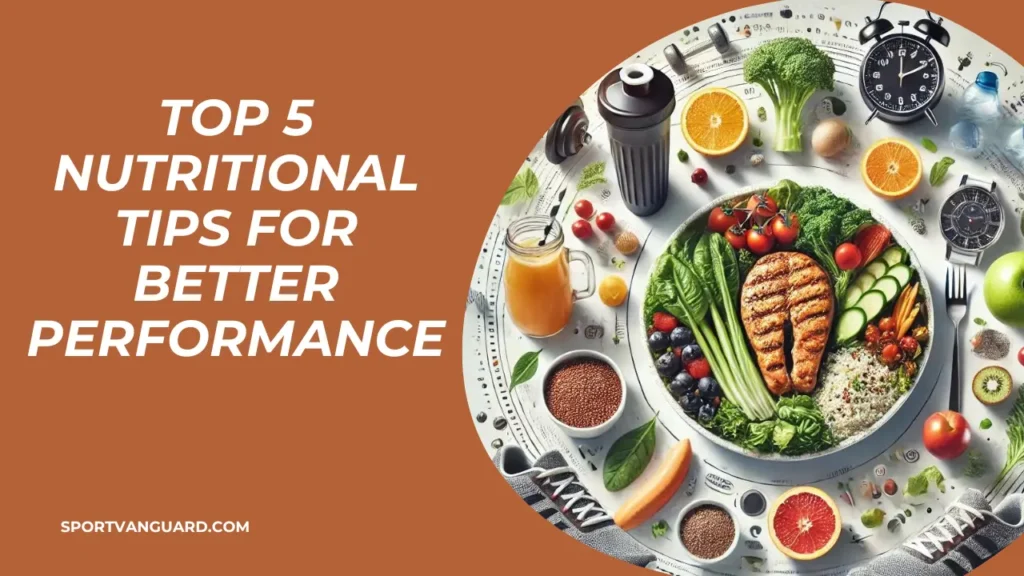
Athletes are always seeking ways of enhancing athletic performance. A proper nutrition plan plays a crucial role in reaching peak results. In this post, we’ll explore the top 5 nutritional tips for enhancing athletic performance, helping boost stamina, endurance, and strength.
Balanced meals can make the difference between a good performance and a great one. By following these tips for enhancing athletic performance, you can recover faster and push harder during workouts.
If you’re serious about improving your training, the key is fueling your body properly. These tips for enhancing athletic performance will guide you to smarter nutrition choices.
1. Prioritize Protein for Muscle Recovery
Protein is essential for repairing muscles after intense workouts. It helps in building new muscle tissue and reducing soreness. Aim for a balance of lean protein sources like chicken, turkey, eggs, and plant-based options like tofu or lentils.
- Timing Matters: Consume protein-rich meals or snacks within 30 minutes after a workout for maximum benefits.
- Spread Intake Throughout the Day: Rather than loading up in one meal, distribute your protein intake across all meals to maintain muscle recovery consistently.
- Opt for Quality: Choose high-quality protein sources, avoiding those high in saturated fat.
2. Stay Hydrated for Optimal Performance
Hydration is critical for maintaining energy and endurance during physical activities. Even mild dehydration can impact performance and focus.
- Drink Water Regularly: Keep water intake steady throughout the day, not just during exercise. The key is to stay ahead of your hydration needs.
- Include Electrolytes: During long workouts or events, replenish lost electrolytes with drinks containing sodium, potassium, and magnesium.
- Avoid Sugary Sports Drinks: Stick with water or electrolyte-rich options, avoiding excess sugar which can lead to energy crashes.
3. Embrace Healthy Fats for Sustained Energy
While many athletes focus on protein and carbs, healthy fats are equally important for long-lasting energy. They fuel endurance activities and promote overall heart health.
- Incorporate Omega-3s: Found in fatty fish like salmon, walnuts, and flaxseeds, omega-3s reduce inflammation and improve recovery.
- Choose Monounsaturated Fats: Avocados, nuts, and olive oil are excellent sources of healthy fats that support brain function and physical endurance.
- Limit Saturated and Trans Fats: Focus on getting fats from natural sources and avoid highly processed foods that are high in unhealthy fats.
4. Carbohydrates Are Key for Energy
Carbs are the primary fuel source for athletes, providing the energy needed for both high-intensity and endurance exercises. Understanding the right type and amount of carbs is vital to optimizing performance.
- Opt for Complex Carbs: Foods like whole grains, sweet potatoes, and brown rice release energy slowly, keeping you fueled throughout your training.
- Pre-Workout Carbs: Consume a carb-rich meal or snack before a workout to give your body the fuel it needs to perform at its best.
- Post-Workout Refuel: After exercise, pair carbs with protein to restore glycogen stores and aid muscle recovery.
5. Micronutrients Support Overall Health
While macronutrients (proteins, carbs, and fats) get most of the attention, micronutrients like vitamins and minerals are equally important. They support immune function, muscle contraction, and bone health.
- Iron for Endurance: Iron supports oxygen transport in the blood, which is critical for endurance. Lean meats, beans, and spinach are great sources.
- Calcium and Vitamin D for Bones: These nutrients are key for strong bones. Dairy products, leafy greens, and sunlight exposure help meet your daily needs.
- B-Vitamins for Energy Metabolism: Found in whole grains, eggs, and legumes, B-vitamins convert food into energy, keeping you active and alert.
By following these top 5 nutritional tips for enhancing athletic performance, athletes can maximize their potential, recover faster, and prevent injuries. Prioritize protein, stay hydrated, embrace healthy fats, fuel up with carbohydrates, and don’t forget the importance of micronutrients. Small changes in your diet can have a big impact on your overall performance!
Remember, the path to peak performance is not just in the gym but also on your plate.
To dive deeper into workout nutrition, check out these helpful guides: